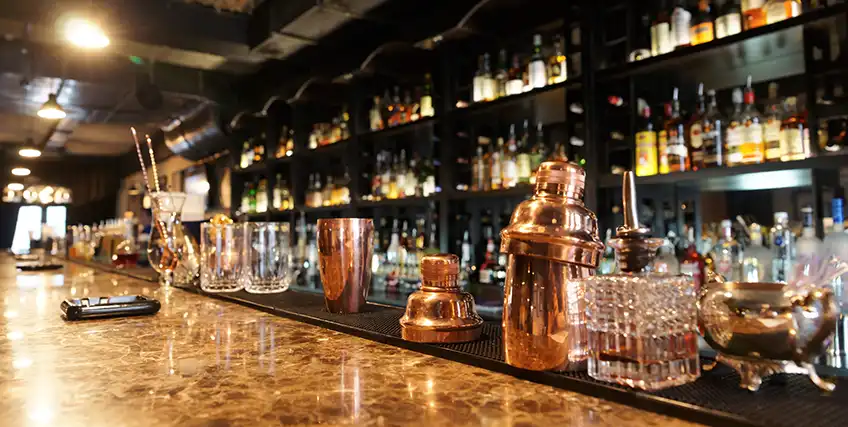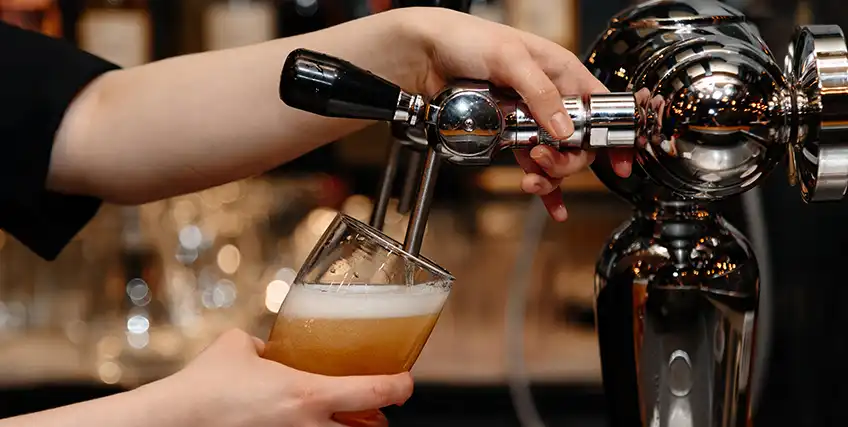
Opening a bar is a thrilling yet challenging venture that requires significant capital to get started. Whether you're dreaming of a lively sports bar, a cozy lounge, or a high-end cocktail bar, obtaining bar and restaurant financing is often one of the first hurdles. One of the best ways to get the money you need is by applying for a loan.
The process can be intimidating if you're unsure where to start. In this comprehensive guide, we’ll take you through everything you need to know about getting a loan to open a bar, from crafting a solid business plan to choosing the right lender and repaying the loan.
1. Create a Solid Business Plan
A well-crafted business plan is crucial for securing a loan to open a bar. It not only helps you clarify your vision for the business, but it also demonstrates to lenders that you have a clear strategy for success. Lenders want to feel confident that their money will be used wisely, so it’s essential to cover all the details of your planned bar. A solid business plan to secure a loan to open a bar should include the following:
Bar Concept and Vision
Your business plan should start with a detailed description of your bar concept. This is where you explain your idea, target audience, and what makes your bar unique. Are you planning to open a trendy cocktail bar, a neighborhood pub, or a high-energy nightclub? This section should cover the atmosphere, the type of drinks and food you will serve, and your marketing approach to attract your ideal customers.
Market Research
Next, lenders will want to see that you understand the market. This means conducting thorough market research to show that there's a demand for your type of bar in the area you plan to open. Research the competition—what other bars exist in your neighborhood, and how will yours stand out? Understand your local demographic, consumer behavior, and customer preferences.
Financial Projections
Lenders expect to see financial projections that cover your startup costs, operational expenses, and expected revenue. Include a detailed budget that that breaks down the use of the loan to open a bar. This includes explaining each cost, such as renovations, inventory, equipment, staff salaries, and marketing. It's also important to provide cash flow projections for at least the first year of operation, including expected sales, expenses, and profits. The goal is to show lenders that your business will be financially sustainable.
Management and Staffing Plan
Lenders will also want to know how your bar will be managed. Outline the key members of your team and their responsibilities. If you have previous experience in the bar or restaurant industry, make sure to highlight that, as lenders often prefer entrepreneurs who are familiar with the business. Include details on staffing, from bartenders to managers, and any training programs you plan to implement to ensure a high-quality customer experience.
2. Determine the Amount of a Loan to Open a Bar
Once you've crafted a business plan, the next step is determining how much capital you will need to get your bar up and running. Startup costs for a bar can vary greatly depending on factors such as location, size, concept, and whether you're leasing or buying a property. Common expenses include:
- Lease or Property Costs: The cost of leasing or purchasing the space for your bar is likely to be one of the most significant expenses. Consider whether the property needs renovations, as this can add to the cost of your loan to open a bar.
- Renovations and Buildout: You may need to budget for significant renovations to make the space suitable for your bar. This could include installing a bar counter, setting up a kitchen if you plan to serve food, and outfitting the space with furniture and decor that matches your concept.
- Licensing and Permits: Securing the necessary permits and licenses to operate a bar can be expensive and time-consuming. These may include an alcohol license, health permits, and local business licenses.
- Equipment: The equipment needed to run a bar includes refrigerators, ice machines, glassware, tables, chairs, a sound system, a POS system, and more. You'll need to calculate the cost of each item.
- Inventory: You'll need to stock your bar with alcohol, mixers, garnishes, and other essentials. Your initial inventory purchase can be significant, especially if you plan to offer a wide range of drinks.
- Working Capital: It's important to have enough working capital to cover your expenses in the early months when your revenue might not be enough to cover all costs. This includes cash for employee wages, utilities, marketing, and other operational expenses.
Once you've identified your startup costs, create a detailed budget and use this as the foundation for your loan application.
3. Explore Loan Options
There are several types of loans available for small businesses like a bar, each with its own advantages and disadvantages. You'll need to carefully consider the terms of each loan option to determine which is best for your situation.
SBA Loans for bars
One of the best financing options for small businesses is the SBA loan. These loans are backed by the U.S. government, making them less risky for lenders, which in turn allows them to offer lower interest rates and longer repayment terms. However, SBA loans are also more challenging to qualify for and involve a lengthy application process. To secure SBA loans for bars, you'll need a strong business plan, a good credit score, and enough collateral to back the loan.
Traditional Bank Loans
Traditional banks offer small business loans with competitive interest rates and favorable terms. However, they typically require a solid credit history and a detailed business plan. Many banks are also cautious about lending to new businesses in high-risk industries like bars, so be prepared to demonstrate how you’ll manage potential risks and provide collateral if necessary.
Business Lines of Credit
A business line of credit can be a good option if you need flexibility in borrowing. Unlike a traditional loan, a line of credit allows you to borrow money as needed and only pay interest on the amount you borrow. This is ideal if you expect fluctuating cash flow, as it provides a safety net for unforeseen expenses.
Online Lenders
In recent years, online lenders have become a popular option for small business owners seeking quick and easy access to capital. While online lenders may offer higher interest rates compared to traditional banks, they tend to have more lenient qualification requirements and faster approval times. For securing a loan to open a bar quickly, online loans are often a good option for businesses that need money expedited or don’t qualify for traditional bank financing.
Equipment Financing
If a significant portion of your startup costs are related to purchasing bar equipment, you may qualify for equipment financing. With this type of loan, the equipment itself serves as collateral, which makes it easier to secure funding. Equipment loans usually have lower interest rates than general business loans, and they can help you purchase the necessary items to get your bar up and running.
4. Check Your Personal and Business Credit
Before applying for a loan, it's important to check your credit score. Lenders will typically evaluate both your personal and business credit scores to determine your eligibility for a loan. A high personal credit score is especially important if you're applying for an unsecured loan. If you don't have a business credit history, lenders will often rely on your personal credit to assess your risk as a borrower.
If your credit score isn't ideal, you might still be able to secure a loan, but you may face higher interest rates or be required to provide collateral. If you have no business credit history, consider using your personal credit or asking a co-signer with good credit to guarantee the loan to open a bar.
5. Prepare Your Documentation
Lenders will require several documents to assess your loan application. These may include:
- Personal financial statements: These include your income, assets, and liabilities.
- Tax returns: Both personal and business tax returns (if applicable) for the last few years.
- Bank statements: Lenders may want to see several months' worth of personal and business bank statements to verify your cash flow.
- Proof of collateral: If you’re using personal assets (like your home) as collateral, you'll need to provide documentation proving ownership and value.
- Business licenses and permits: Include any necessary documents, such as business incorporation papers or health permits.
Having all your paperwork in order can speed up the loan approval process.
6. Research and Compare Lenders
Once you have a list of potential lenders, it's time to shop around and compare loan offers. Look at the interest rates, repayment terms, fees, and loan amounts. You should also consider the lender's reputation and customer service—working with a responsive and supportive lender can make a significant difference, especially if you run into issues during the repayment process.
7. Apply for the Loan
After selecting a lender, it's time to submit your loan application. Be prepared to answer questions about your business plan, financials, and personal background. Lenders may also request additional documents or clarification during the application process. Be patient, as loan approvals can take anywhere from a few days to several weeks, depending on the type of loan.
8. Loan Approval and Funding
If your pub business loan is approved, the lender will outline the terms of the agreement, including the interest rate, repayment schedule, and any fees. Make sure you understand these terms before accepting the loan. Once you've signed the agreement, the funds will be disbursed according to the lender's process, which could involve a lump sum payment or a drawdown against a line of credit.
9. Use the Loan to Open a Bar Wisely
After getting a loan to open a bar, use the funds according to your business plan. Prioritize the necessary expenses, such as securing permits, completing renovations, purchasing equipment, and stocking your bar. Be careful not to overspend on non-essential items early on.
10. Repay the Loan
Once your bar is open, it's time to focus on repaying your loan. Stay on top of your cash flow to ensure you can make timely payments. If you encounter difficulties, talk to your lender about adjusting the repayment terms. Managing your finances carefully and maintaining a steady revenue stream will help you successfully repay your loan and grow your business.
Final Thoughts on Securing a Loan to Open a Bar
Starting a bar can be a rewarding experience, but it requires careful planning, financial discipline, and a willingness to work hard. By following these steps and applying for the right loan to open a bar, you'll be well on your way to building a successful bar.
FAQs About a Loan to Open a Bar
Is an SBA loan a financing option to open a bar?
Yes, SBA loans are a financing option. To secure SBA loans for bars, you'll need a strong business plan, a good credit score, and enough collateral to back the loan.
When applying for a loan to open a bar, do you need good credit?
Lenders will evaluate both your personal and business credit scores to determine your eligibility for a loan. If your credit score isn't ideal, you might still be able to secure a loan, but you may face higher interest rates or be required to provide collateral.
How are business loans for bars dispersed?
A loan to open a bar will be disbursed according to the lender's process. This could mean a lump sum payment or a drawdown against a line of credit.
What documentation is needed for getting a loan to open a bar?
The documentation for bar and restaurant financing includes personal financial statements, tax returns, bank statements, proof of collateral, and business licenses and permits.
What does working capital include when securing a loan to open a bar?
Working capital should cover your expenses in the early months when your revenue might not be enough to cover all costs. Working capital includes cash for employee wages, utilities, marketing, and other operational expenses.




